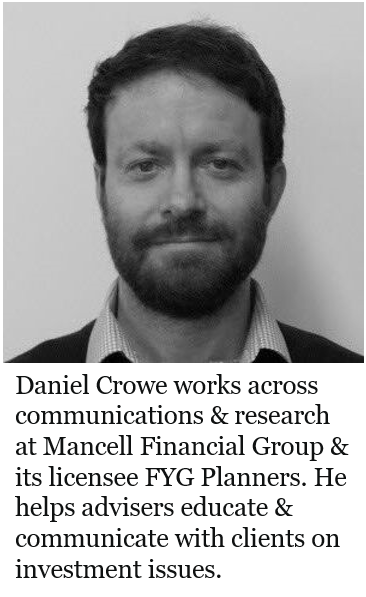
The Australian Financial Review covered the Evans Dixon, Dixon Advisory, E&P saga this morning, or whatever they want to call themselves now to hide their past.
For those unfortunates who were involved, it’s a sad tale. Hindsight will have them questioning how they found themselves in the mess. They will be mourning both money and opportunities lost. As investors, we’ve probably all been there, but in this respect I’m talking about the messes we make by our own hand. There would be an even greater level of pain when the failure was outsourced to a supposed professional.
Looking for a Canberra financial advisor and certified fiduciary?
When outsourcing there’s always the issue of trust. The big issue here appears to be the trusted name. A company that has been around for years is a great lure, it makes someone feel safer. There are many ways to sort the wheat from the chaff, but none better than name and referral.
Another ‘sorter’ I often see pop up in the media, usually when journalists have to fill space, is the ‘questions to ask your financial adviser’ article. It’s an supposedly an empowering piece about bowling into meet an adviser on the front foot. Sometimes it’s a bunch of confrontational stuff about fees, how the adviser gets paid, commissions etc.
I never see the potential question about the investment philosophy. Evans Dixon, Dixon Advisory, E&P put clients into their own funds in residential real estate and solar. This isn’t a belief in capital markets or asset allocation. It’s a belief in pushing your own products. Good advisers were moving away from such vertical integration 30 years ago!
The importance of having an investment philosophy? It offers a reference point. Will things remain consistent, or will the adviser be flapping around looking for ‘new opportunities’ every time the world changes? The reason a good adviser won’t be flapping around is because they have a set of principles to guide them no matter what is occurring.
The investment philosophy is based on these principles. Not a set of products, like US Masters Residential Real Estate Fund, New Energy Solar, or whatever else Evans Dixon, Dixon Advisory, E&P has put together. A set of principles means there’s no link between the adviser and the funds used. No need to worry about who is paying the adviser. So the investment philosophy a one/two punch question. It solves whether they’re using a common sense or scatter gun approach.
With a set of principles, a portfolio could be put together based on the goals of the client. Nothing in the portfolio needs to come from any specific fund manager. It only needs to be a fund manager that offers the asset class required. There will likely be multiple. I can’t imagine any portfolio requiring the specific inclusion of a US residential real estate fund or a solar fund.
It would be fascinating to know the percentages sizes these funds took up within the client portfolios. They are nothing but speculative and should be considered a luxury after proper portfolio construction. They shouldn’t be there at all, but it would be outrageous if they were above 5% of the portfolio, especially given the client demographics profiled in the AFR story.
Nice for Evans Dixon. They can change their name and attempt to wash their hands of this farce. Maybe they’ll figure out an investment philosophy in the process. Unfortunately, the clients can’t get away so easily.
Another problem facing angry Dixon Advisory clients is that turning their back on the firm is expensive and time-consuming. That is because a large share of their investments were in ASX-listed Dixon funds such as the URF – for which there is a wave of sellers and few buyers.
Other investments such as the Fort Street property funds are unlisted and buyers must be found in a private market. This has made it all but impossible for Dixon clients to extract themselves entirely from the firm.
It’s unfortunate, but you can’t just walk in and expect that your adviser will have a philosophy that leaves as little to chance as possible. The best advisers will make you part of an education process. We give new clients The Investment Answer. It’s 96 pages, it’s probably 60 pages after removing spacing, footnotes and references. It’s not a big ask to read it. Update: 2022 we’ve written our own book: Your Investment Philosophy. Same idea. At the end, an investor should have a grasp of what’s probable, possible and that there are no guarantees. Clients may want to palm everything off, but there should at least be some intellectual buy in. An adviser should demand something of you.
Advisers can’t and shouldn’t sell performance. No one knows what the market, an asset class or particular security or investment will do from one year to the next. You can know what’s possible and what isn’t, what’s based on evidence and what isn’t.
The sad thing about this story is it intersects with a personal belief. I think we only have the chance to recover from one large financial mistake in life. And it needs to be as early in your life as possible. The later it is, the less chance of recovery. Into your 50’s or 60’s and too much human capital has been spent. Working years gone. Working to recover in your 60’s? You might be just working for good.
Being reckless and speculative with someone’s money as they age is a terrible breach of trust.
This represents general information only. Before making any financial or investment decisions, I suggest you consult a financial planner to take into account your personal investment objectives, financial situation and individual needs. Don’t make financial or investment decisions on the basis of blog post or sourcing advice from internet forums, if you’d like a introduction to investing, please consider reading Your Investment Philosophy, which offers an evidence based primer for building your own investment philosophy.


